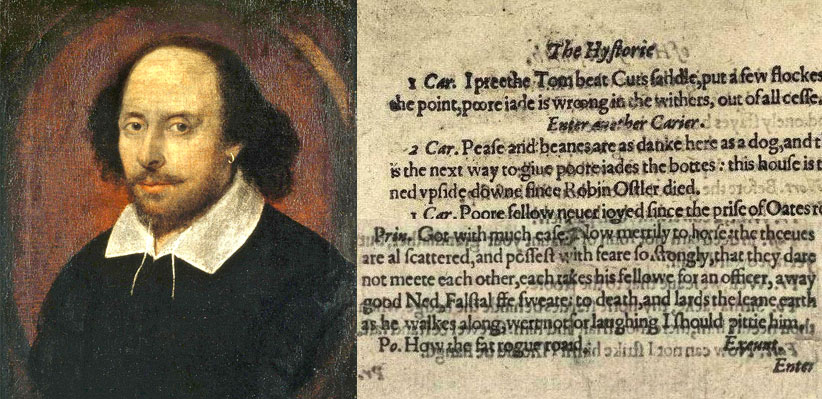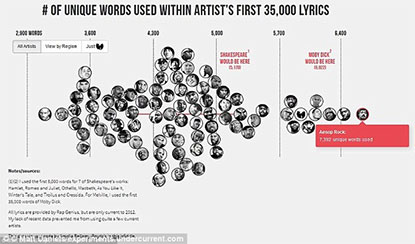 In honor of William Shakespeare we are celebrating the 400th anniversary of his death on April 23, 2016. What better way to do this, than by highlighting the writing done by first-year students in Associate Professor of English John Wesley’s first-year seminar, A Year in the Life of William Shakespeare? This first-year seminar in scholarly inquiry studies four remarkable plays Shakespeare wrote or saw into production in 1599, the same year he opened the Globe Theatre. In the first half of the course, students were introduced to the myriad ways in which Shakespeare’s 1599 plays are shaped by and give shape to the political and cultural intrigues of that year. In the second half of the course, students turned to a play (and year) of their own choosing, the historicist analysis of which is the basis of an independent research project. As part of this project, students were asked to prepare a blog post that reflected on aspects of Shakespeare’s life, a specific work, or a resource or organization associated with Shakespeare, or to provide a personal interpretation of a play. During the month of April, we’ll feature the posts from students that celebrate all things Shakespeare!
In honor of William Shakespeare we are celebrating the 400th anniversary of his death on April 23, 2016. What better way to do this, than by highlighting the writing done by first-year students in Associate Professor of English John Wesley’s first-year seminar, A Year in the Life of William Shakespeare? This first-year seminar in scholarly inquiry studies four remarkable plays Shakespeare wrote or saw into production in 1599, the same year he opened the Globe Theatre. In the first half of the course, students were introduced to the myriad ways in which Shakespeare’s 1599 plays are shaped by and give shape to the political and cultural intrigues of that year. In the second half of the course, students turned to a play (and year) of their own choosing, the historicist analysis of which is the basis of an independent research project. As part of this project, students were asked to prepare a blog post that reflected on aspects of Shakespeare’s life, a specific work, or a resource or organization associated with Shakespeare, or to provide a personal interpretation of a play. During the month of April, we’ll feature the posts from students that celebrate all things Shakespeare!
Congratulations to our wonderful first-year writers. For additional online resources about Shakespeare, check out these sites:
- British Library: http://www.bl.uk/
- Folger Shakespeare Library: http://www.folger.edu/
- Globe Theatre: http://www.shakespearesglobe.com
- Internet Shakespeare Editions: http://internetshakespeare.uvic.ca
- Shakespeare 400: http://www.shakespeare400.org/
Who Is Allowed To Be the Custodian of Knowledge?
By Autumn Raw
Two years ago I was assigned Hamlet in my college-level English course, and having been pre-empted by many that Hamlet was a very, very sad snooze fest, I ventured onto the internet to look for means of making Shakespeare a good deal more interesting. At that point I had read several Shakespearean plays, and had enjoyed them, but this was not a point in time where my excitement to read plays written 400 years ago was peaking. Hamlet was “literally going to bore me to death”(I actually wrote that in the reader’s notebook I turned in for a grade).
So, I went online to find a way to make Shakespeare fresh and exciting to me, and creatively typed ‘Shakespeare’ into Youtube. There are a variety of videos to scroll through: filmed productions, conspiracy theories, several fanvids of “Shakespeare In Love”. A little ways down, you’ll run into a video titled: “Hip-Hop & Shakespeare? Akala at TEDxAldeburgh”. This video revolutionized the way I viewed Shakespeare, and it is a required watch. https://www.youtube.com/watch?v=DSbtkLA3GrY (The video)
The video is only twenty minutes long, and it opens with Akala issuing a pop quiz to the audience of his talk. The question: Is this quote hip-hop, or Shakespeare? Over the course of the short quiz, the audience was surprised to find that a majority of the lines they assumed to be Shakespeare’s were actually the products of rappers. This segues into the proper speech itself, in which Akala will lay down a beat, and rap a sonnet/lines over it from a variety of Shakespeare’s plays.
(Here’s a quiz that is quite similar to the one Akala gave: http://www.sporcle.com/games/the_hmh_project/shakespeare-or-hip-hop) (DailyMail)
Hip-hop and Sha kespeare are typically never mentioned in the same breath, but the two subjects are more similar than they are dissimilar: musicality is one thing that ties the two subjects together. Hip-hop has a long musical history, “Rap shares its roots with other forms of traditionally African-American music, such as jazz, blues, and soul. Rap may also be closely linked to reggae music, a genre that also developed from the combination of traditional African drumming”(Blanchard). Shakespeare’s lines have a distinct rhythm to them, and this makes it relatively easy to set them to music. The Guardian, writing about a workshop Akala was running in 2009, highlights the similarities between the two:
kespeare are typically never mentioned in the same breath, but the two subjects are more similar than they are dissimilar: musicality is one thing that ties the two subjects together. Hip-hop has a long musical history, “Rap shares its roots with other forms of traditionally African-American music, such as jazz, blues, and soul. Rap may also be closely linked to reggae music, a genre that also developed from the combination of traditional African drumming”(Blanchard). Shakespeare’s lines have a distinct rhythm to them, and this makes it relatively easy to set them to music. The Guardian, writing about a workshop Akala was running in 2009, highlights the similarities between the two:
“ In a Q&A session, only two of them say they’d have come if today hadn’t involved rapping. That begins to change when Akala engages them in a series of exercises that explore the close relationship between the rhythms of modern hip-hop and the iambic pentameter of Shakespeare. He hands out cards printed with a couple of lines. We have to decide whether they’re the work of the playwright or a rapper. It’s harder than you’d think. The kids are adamant that certain words and phrases are those of a rapper, but they’re actually from Shakespeare. And vice versa. It’s a hook, and it’s only half an hour later that they’re translating Sonnet 18 into hip-hop verse” (The Guardian).
This is very exciting, because students who before lacked the motivation to read Shakespeare, and look deeply into the meaning of Shakespeare’s verses, are now able to take it, and rhythmically warp it to become more interesting to them. It’s ingenious, and opens up Shakespeare’s language and makes it more accessible to people who before found it to be dry and taxing to read.
The Hip-Hop Shakespeare site: http://www.hiphopshakespeare.com/
Bibliography
Akala. “Hip-Hop & Shakespeare? Akala at TEDxAldeburgh.” YouTube. YouTube, 7 Dec. 2011. Web. 01 Mar. 2016.
Blanchard, Becky. “THE SOCIAL SIGNIFICANCE OF RAP & HIP-HOP CULTURE.” THE SOCIAL SIGNIFICANCE OF RAP & HIP-HOP CULTURE. Ethics of Development in a Global Environment (EDGE), July-Aug. 1999. Web. 01 Mar. 2016.
Emery, Andrew. “Shakespeare: How Do I Compare Thee to Hip-hop?” The Guardian. Guardian News and Media, 15 Apr. 2009. Web. 01 Mar. 2016.
MailOnline, Victoria Woollaston for. “Are Rappers Better Linguists than SHAKESPEARE? Complex Rhymes Are ‘second Nature’ to Hip-hop Artists.” Mail Online. Associated Newspapers, 11 Feb. 2015. Web. 01 Mar. 2016.
